1-Colonial Period in American Literature 1607-1776
| Site: | Plateforme pédagogique de l'Université Sétif2 |
| Cours: | History of American Literature |
| Livre: | 1-Colonial Period in American Literature 1607-1776 |
| Imprimé par: | Visiteur anonyme |
| Date: | dimanche 15 février 2026, 00:16 |
Description
1. 1. Prominent Authors and Works
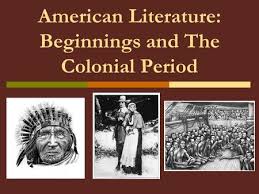
The history of American literature can be traced back to early oral traditions of Native Indian people. According to many American literary historians, the origins of American literature are related to songs, myths, legends and tales of Indian people which were transmitted orally. However, there are different views about native Indians’ contributions to the history of American literature.
For some historians, native Americans, the first inhabitants of the continent, did not develop anything we can call “literature” – their stories and poems were spread orally, which means the American literally history begins with the age of colonialism. (Karvina). This is to deny their contributions to American literature. Most importantly, Peter High says: “The story of American literature begins in the early 1600s, long before there were any “Americans”. The earliest writers were Englishmen describing the English exploration and colonization of the New World (America)” (5). He denies the existence of native Indians to attribute the beginning of American literature to early Englishmen settlers. In addition, according to Vanspanckeren, American literature begins with the orally transmitted myths, legends, tales, and lyrics (always songs) of Indian cultures. There was no written literature among the more than 500 different Indian languages and tribal cultures that existed in North America before the first Europeans arrived. In this regard, early oral Indian literary contributions were lost because they were not preserved in writing. For Vanspanckeren, the arrival of the white man for Native Americans was an announcement of the apocalypse. As one of them, an Iriquois chief called Handsome Lake, put it at the end of the eighteenth century, “white men came swarming into the country bringing with them cards, money, fiddles, whiskey, and blood corruption” (4). Early white settlers destroyed native Indians’ oral literary productions. In fact,
Native American oral literature is quite diverse examples of almost every oral genre can be found in American Indian literature: lyrics, chants, myths, fairy tales, humorous anecdotes, incantations, riddles, proverbs, epics, and legendary histories. There are also certain creation stories which became popular. The songs and narratives, in turn, range from the sacred to the humorous, in genres which include lullabies, war chants, love songs and songs for children's games or dance ceremonials. Indian oral tradition only recently was inserted in the study of American literature, although it is considered one of the richest and least explored topics literary history. (3)
Despite their great contributions to American literature, their literary productions have been marginalized.
The literature produced in that part of America known as the United States did not begin as an independent literature. The early colonists were Englishmen who brought with them their own language, books, and modes of thought. England had a world−famous literature before Puritans established a permanent settlement across the Atlantic. Shakespeare (1564-1616) had died four years before the Pilgrims landed at Plymouth. For nearly two hundred years after the first English settlements in America, the majority of the works read there were written by English authors.
The character of early American literature is strongly influenced by several factors: It was the era of colonizing the continent. Since not only the English explored and claimed the territories, the beginnings of American literature are more or less connected also with French, Spanish or Dutch literatures as well.
The first writers brought mainly English ideas and ways of writing, which means early American literature is based on the literature of England. As years passed and literary theory developed, the writers who adopted the English style are now sometimes called pale faces (Franklin, Longfellow, James, Pound). Their poetry is sometimes referred to as “cooked poetry”. On the other hand, there were authors who explored new topics and helped shape America’s own literary tradition. Those are called redskins (Whitman, Emerson, the Beat Generation). Their poetry is referred to as “raw poetry” (High 4).
Religion played an important part in the writers’ lives. Many writings of the period were sermons and theological books. The fact that the Pilgrims landed in the Massachusetts Bay in 1620 had an immense influence on the culture of the newly developing colonial system. The common topics in the early periods were connected with the issues of living in a new land (agriculture, explorations, and relations with the native people) and travelling (travel logs, journals).
According to Britannica, The first colonists of North America wrote, often in English, about their experiences starting in the 1600s. This literature was practical, straightforward, often derivative of literature in Great Britain, and focused on the future (Luebering). The most famous authors are:
-JOHN SMITH (1580–1631)
He is considered to be the first American writer. He was an explorer and colonist; he helped found the first English colony in America Jamestown in 1607. His A True Relation of Virginia is said to be the first American book written in English. It describes the problems of colonizing the area. A True Relation of Virginia and Description of New England are fascinating advertisements to persuade the reader to settle in the New world.
In his General Histoire of Virginia, New England and the Summer Isles, he wrote about adventures of a girl named Pocahontas. It is stated: “Two great stones were brought before Powhattan (The Indian king): then as many as could dragged him (Smith) to them, and thereone laid his head, and being ready with their clubs, to beat out his brain, Pocahontas, the King’s dearest daughter, got his head in her arms…to save him from death” (30)
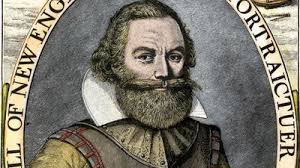
-WILLIAM BRADFORD (1590–1657)
He was a Puritan writer who described life in the early English settlements. His book Of Plymouth Plantation is full of religious topics and depictions of a difficult life in the colony. It is mainly about the conflicts between Puritans and native Indians.
At the very beginning of Of Plymouth Plantation, Bradford announces that he will write in the Puritan “plain style, with singular regard to the simple truth in all things,” (2) as far as his “slender judgement” will permit. He used “It pleased God” (everything is controlled by God) in his book.
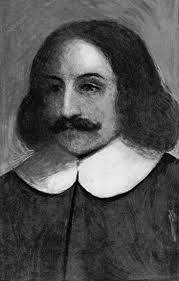
-ANNE BRADSTREET (1612–1672)
She wrote lyrical, religious and personal poetry. She is the author of To My Dear and Loving Husband. She was an admirer of Spenser and Sidney.
To My Dear and Loving Husband" (1678) uses the oriental imagery, love theme, and idea of comparison popular in Europe at the time, but gives these a pious meaning at the poem's conclusion:
If ever two were one, then surely we.
If ever man were loved by wife, then thee;
If ever wife was happy in a man,
Compare with me, ye women, if you can.
I prize thy love more than whole mines of gold
Or all the riches that the East doth hold.
My love is such that rivers cannot quench,
Nor ought but love from thee, give recompense.
Thy love is such I can no way repay,
The heavens reward thee manifold, I pray.
Then while we live, in love let s so persevere
That when we live no more, we may live ever.
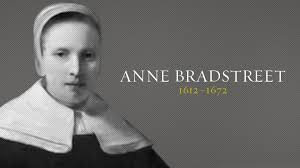
-MARY ROWLANDSON (1637–1711)
She gave us the image of a woman’s life in the colonial period. Her A Narrative of the Captivity and Restoration of Mrs. Mary Rowlandson tells her story of being kidnapped by Native Americans. The book became a bestseller.
-COTTON MATHER (1663-1728)
He was a prolific writer (450 work). Whenever something happened to him in his life, he wrote a religious book. For example, “When he had pain in his stomach or teeth, he thought about how he had broken God’s law with his stomach or teeth”. His famous works are: Magnalia Christi Americana which is about description of Salem witch trials. His style deviated from Puritans’ plain writing. He used complicated language using Latin words which posed difficulty for his readers.
His most ambitious work exhaustively chronicles the settlement of New England through a series of biographies. The huge book presents the holy Puritan errand into the wilderness to establish God’s kingdom; its structure is a narrative progression of representative American "Saints' Lives." His zeal somewhat redeems his pompousness: "I write the wonders of the Christian religion, flying from the deprivations of Europe to the American strand." (High 9-10)
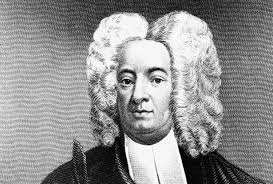
-EDWARD TAYLOR (1645-1729)
He is one of the best of the Puritan poets. He advocated “rebirth” of the “Puritan way”. He created rich and unusual images. In one of his poems, he said about religious people that they are as rare “as black swans that in milkwhite rivers are” (8). His chief inspiration is to be found in the writings of the English metaphysical poets, like Donne (conceit). This is an example of his poetry:
Meditation 38: 1 Joh. 2.1. An Advocate With the Father -
by Edward Taylor
Oh! what a thing is man? Lord, who am I?
That Thou shouldst give him law (Oh! golden line)
To regulate his thoughts, words, life thereby.
And judge him wilt thereby too in Thy time.
A court of justice Thou in heaven hold'st
To try his case while he's here housed on mold.
How do Thy angels lay before Thine eye
My deeds both white and black I daily do?
How doth Thy court Thou Panelist there them try?
But flesh complains. What right for this? let's know.
For right, or wrong I can't appear unto't.
And shall a sentence pass on such a suite?
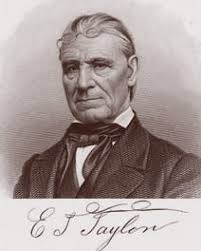
-JONATHAN EDWARDS:
He advocated “the Great Awakening” in American colonial literature.
These are some extracts from his famous sermon which is entitled Sinners in the Hands of an Angry God”.
The devil stands ready to fall upon them, and seize them as his own, at what moment God shall permit him. They belong to him; he has their souls in his possession, and under his dominion. The scripture represents them as his goods, Luke 11:12. The devils watch them; they are ever by them at their right hand; they stand waiting for them, like greedy hungry lions that see their prey, and expect to have it, but are for the present kept back. If God should withdraw his hand, by which they are restrained, they would in one moment fly upon their poor souls. The old serpent is gaping for them; hell opens its mouth wide to receive them; and if God should permit it, they would be hastily swallowed up and lost. (Edwards)
There are in the souls of wicked men those hellish principles reigning, that would presently kindle and flame out into hell-fire, if it were not for God’s restraints. There is laid in the very nature of carnal men, a foundation for the torments of hell. There are those corrupt principles, in reigning power in them, and in full possession of them, that are seeds of hell-fire. These principles are active and powerful, exceeding violent in their nature, and if it were not for the restraining hand of God upon them, they would soon break out, they would flame out after the same manner as the same corruptions, the same enmity does in the hearts of damned souls... The souls of the wicked are in Scripture compared to the troubled sea, Isaiah 57:20. For the present, God restrains their wickedness by his mighty power, as he does the raging waves of the troubled sea, saying, “Hitherto shalt thou come, but no further,” but if God should withdraw that restraining power, it would soon carry all before it. Sin is the ruin and misery of the soul; it is destructive in its nature; and if God should leave it without restraint, there would need nothing else to make the soul perfectly miserable. (Edwards)
The wrath of God is like great waters that are dammed for the present; they increase more and more, and rise higher and higher, till an outlet is given; and the longer the stream is stopped, the more rapid and mighty is its course, when once it is let loose. It is true, that judgment against your evil works has not been executed hitherto; the floods of God’s vengeance have been withheld; but your guilt in the mean time is constantly increasing, and you are every day treasuring up more wrath; the waters are constantly rising, and waxing more and more mighty; and there is nothing but the mere pleasure of God, that holds the waters back, that are unwilling to be stopped, and press hard to go forward. If God should only withdraw his hand from the flood-gate, it would immediately fly open, and the fiery floods of the fierceness and wrath of God, would rush forth with inconceivable fury, and would come upon you with omnipotent power; and if your strength were ten thousand times greater than it is, yea, ten thousand times greater than the strength of the stoutest, sturdiest devil in hell, it would be nothing to withstand or endure it. (Edwards)
-SOUTHERN WRITERS
1- Robert Beverley: his writings are about nature and society. His famous book is History and Present State of Virginia in which he used a clear style.
2-William Byrd: his outstanding book is History of the Dividing Line that describes the frontier between Virginia and the forest. His ideas about the Indians and slaves were liberal. He viewed that English should marry Indians and slaves have bright talents.
2. 2-Major Types in Literature
There are several genres in early colonial American literature. According to Vanspanckeren,
Pirates, adventurers, and explorers opened the way to a second wave of permanent colonists, bringing their wives, children, farm implements, and craftsmen's tools. The early literature of exploration, made up of diaries, letters, travel journals and reports to the explorers' financial backers – European rulers or, in mercantile England and Holland joint stock companies – gradually was supplanted by records of the settled colonies. Because England eventually took possession of the North American colonies, the best-known and most-anthologized colonial literature is English. As […] American life becomes increasingly multicultural, scholars are rediscovering the importance of the continent's mixed ethnic heritage. Although the story of literature now turns to the English accounts, it is important to recognize its richly cosmopolitan beginnings” (5)
In this regard, literary types were relevant to Americans’ lifestyle. They are as follows:
1- Historical works:
They are mainly about recording the life of Puritans and their journey to America. They shed light on the idea of providence which means that the described world is always seen as a reflection of the divine order.
2- Biographies and Diaries:
e.g. Thomas Shepard autobiography.
3- Sermons and Theological Works
Sermons of Cotton Mather and Jonathan Edwards
They were written in plain style.
4- Poetry
The poetry of this period shows a great influence of Horace, Spenser and Sidney.
Consequently, early American colonial literature focuses on topics relevant to people’s lifestyle as puritan settlers. The major works shed light on religious and social topics to cope with the new land.